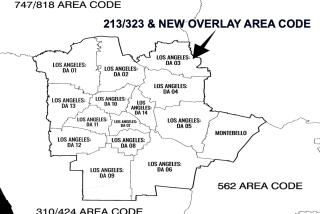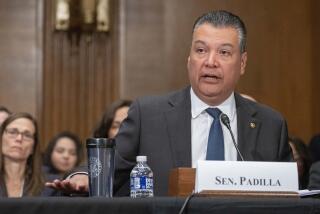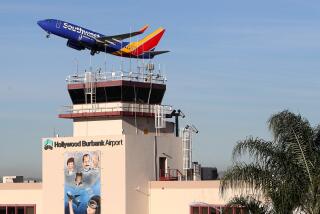They Would Rather Fight Than Switch
- Share via
The cities of Burbank and Glendale have filed a complaint with the state Public Utilities Commission in an effort to avoid an area-code split set to take effect next summer.
Beginning June 14, 1997, the 818 area code will be split in two to keep up with leapfrogging demand for new telephone numbers. Current proposals by the telecommunications industry call for the new 626 area code to cover the San Gabriel Valley as well as Burbank and Glendale.
The problem is, residents and officials of the two cities don’t like the plan, complaining the change would cost them millions of dollars as they change everything from letterheads and business cards to World Wide Web pages and the sides of delivery vans.
Besides, they argue, Burbank and Glendale are more a part of the San Fernando Valley--which will keep the 818 area code, at least for now--than of the San Gabriel Valley. In the complaint filed March 1, the cities argue that the boundaries of the split should be moved east to Glendale’s border with Pasadena.
“In our view, we should have a split plan that makes geographic sense,” said attorney Norman Pedersen, who is representing the two cities. “This is something that would benefit everyone.”
How to split 818 geographically was decided last year by a consortium of telecommunications companies that included long-distance carriers such as AT&T; and MCI as well as cable companies and local service providers such as Pacific Bell.
Pacific Bell is serving as the code administrator--a sort of designated hitter charged with presenting the plan to the Public Utilities Commission. That has put Pacific Bell in an awkward position because it must bear the cost of defending the plan before the commission, even though it voted against the proposed split.
Pacific Bell supports the creation of so-called overlay area codes, which would affect only new numbers and allows old numbers to remain the same. But as more companies try to provide phone service in a deregulated market, competitors claim Pacific Bell has an unfair advantage because it already provides the bulk of the service. So they support dividing area codes geographically.
“We have to spend the money litigating this and answering the complaint,” said Pacific Bell attorney Coleen Mary O’Grady. “We’re the messenger and we’ve been shot.”
Where to draw the lines was determined more or less by the numbers, according to Pacific Bell spokeswoman Linda Bonniksen. About 2.4 million phone numbers would be affected by the change to 626--or roughly 46% of the numbers that are now part of 818. That sort of split, Bonniksen said, allows both area codes about the same amount of room to grow.
Without action, she said, 818 will run out of new numbers by the end of 1998. Even with the split, both area codes will need to be divided again in about eight years if current growth continues, she said.
New numbers are required for everything from cellular phones and fax machines to credit card readers at gas pumps. Bonniksen said the number of area codes statewide will double from the current 13 to 26 by the end of the decade--including a new 562 area code for southeast Los Angeles County to debut later this year.
Pedersen, the attorney for Burbank and Glendale, acknowledged the need for new area codes. But the complaint asks that the boundary be moved east to the San Rafael Hills, which separate Glendale from Pasadena and the San Gabriel Valley from the San Fernando Valley.
Pedersen said the immediate financial impacts would be reduced because fewer people would be required to change their numbers right away. He also argued that people associate area codes with geographic areas and that a new area code for the two cities would be confusing.
“It would be unclear to a North Hollywood customer from the area code whether IKEA is located in downtown Burbank [as it is] or distant Glendora in the San Gabriel Valley,” according to the complaint.
Bonniksen said the industry consortium considered drawing the boundary along Glendale’s eastern border, but decided against it after determining such a move would create a lopsided distribution of numbers.
About 66% of the numbers would remain 818 and 34% would be required to change under that scenario--meaning the 818 area code would have to be split again in just a few years, Bonniksen said. “It would have a worse effect in terms of the life of the area code,” she said.
The issue will be decided within a few months by an administrative law judge, who will recommend a course of action to the Public Utilities Commission. The commission is scheduled to rule on the split later this year.
More to Read
Sign up for Essential California
The most important California stories and recommendations in your inbox every morning.
You may occasionally receive promotional content from the Los Angeles Times.










